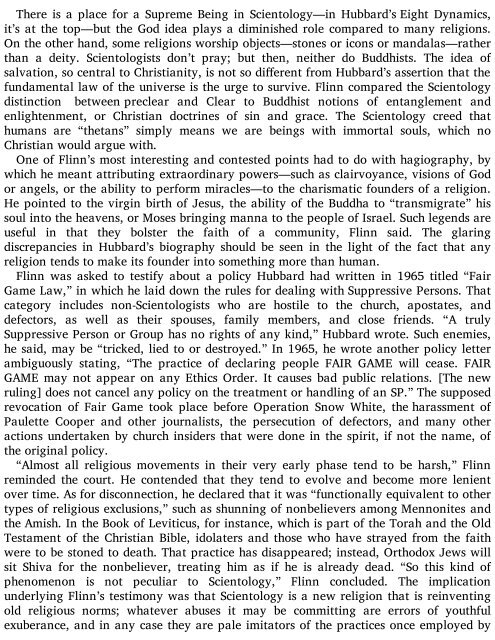going-clear-scientology-hollywood-and-the-prison-of-belief-by-lawrence-wright-2
going-clear-scientology-hollywood-and-the-prison-of-belief-by-lawrence-wright-2
going-clear-scientology-hollywood-and-the-prison-of-belief-by-lawrence-wright-2
You also want an ePaper? Increase the reach of your titles
YUMPU automatically turns print PDFs into web optimized ePapers that Google loves.
There is a place for a Supreme Being in Scientology—in Hubbard’s Eight Dynamics,<br />
it’s at <strong>the</strong> top—but <strong>the</strong> God idea plays a diminished role compared to many religions.<br />
On <strong>the</strong> o<strong>the</strong>r h<strong>and</strong>, some religions worship objects—stones or icons or m<strong>and</strong>alas—ra<strong>the</strong>r<br />
than a deity. Scientologists don’t pray; but <strong>the</strong>n, nei<strong>the</strong>r do Buddhists. The idea <strong>of</strong><br />
salvation, so central to Christianity, is not so dierent from Hubbard’s assertion that <strong>the</strong><br />
fundamental law <strong>of</strong> <strong>the</strong> universe is <strong>the</strong> urge to survive. Flinn compared <strong>the</strong> Scientology<br />
distinction between pre<strong>clear</strong> <strong>and</strong> Clear to Buddhist notions <strong>of</strong> entanglement <strong>and</strong><br />
enlightenment, or Christian doctrines <strong>of</strong> sin <strong>and</strong> grace. The Scientology creed that<br />
humans are “<strong>the</strong>tans” simply means we are beings with immortal souls, which no<br />
Christian would argue with.<br />
One <strong>of</strong> Flinn’s most interesting <strong>and</strong> contested points had to do with hagiography, <strong>by</strong><br />
which he meant attributing extraordinary powers—such as clairvoyance, visions <strong>of</strong> God<br />
or angels, or <strong>the</strong> ability to perform miracles—to <strong>the</strong> charismatic founders <strong>of</strong> a religion.<br />
He pointed to <strong>the</strong> virgin birth <strong>of</strong> Jesus, <strong>the</strong> ability <strong>of</strong> <strong>the</strong> Buddha to “transmigrate” his<br />
soul into <strong>the</strong> heavens, or Moses bringing manna to <strong>the</strong> people <strong>of</strong> Israel. Such legends are<br />
useful in that <strong>the</strong>y bolster <strong>the</strong> faith <strong>of</strong> a community, Flinn said. The glaring<br />
discrepancies in Hubbard’s biography should be seen in <strong>the</strong> light <strong>of</strong> <strong>the</strong> fact that any<br />
religion tends to make its founder into something more than human.<br />
Flinn was asked to testify about a policy Hubbard had written in 1965 titled “Fair<br />
Game Law,” in which he laid down <strong>the</strong> rules for dealing with Suppressive Persons. That<br />
category includes non-Scientologists who are hostile to <strong>the</strong> church, apostates, <strong>and</strong><br />
defectors, as well as <strong>the</strong>ir spouses, family members, <strong>and</strong> close friends. “A truly<br />
Suppressive Person or Group has no rights <strong>of</strong> any kind,” Hubbard wrote. Such enemies,<br />
he said, may be “tricked, lied to or destroyed.” In 1965, he wrote ano<strong>the</strong>r policy letter<br />
ambiguously stating, “The practice <strong>of</strong> declaring people FAIR GAME will cease. FAIR<br />
GAME may not appear on any Ethics Order. It causes bad public relations. [The new<br />
ruling] does not cancel any policy on <strong>the</strong> treatment or h<strong>and</strong>ling <strong>of</strong> an SP.” The supposed<br />
revocation <strong>of</strong> Fair Game took place before Operation Snow White, <strong>the</strong> harassment <strong>of</strong><br />
Paulette Cooper <strong>and</strong> o<strong>the</strong>r journalists, <strong>the</strong> persecution <strong>of</strong> defectors, <strong>and</strong> many o<strong>the</strong>r<br />
actions undertaken <strong>by</strong> church insiders that were done in <strong>the</strong> spirit, if not <strong>the</strong> name, <strong>of</strong><br />
<strong>the</strong> original policy.<br />
“Almost all religious movements in <strong>the</strong>ir very early phase tend to be harsh,” Flinn<br />
reminded <strong>the</strong> court. He contended that <strong>the</strong>y tend to evolve <strong>and</strong> become more lenient<br />
over time. As for disconnection, he declared that it was “functionally equivalent to o<strong>the</strong>r<br />
types <strong>of</strong> religious exclusions,” such as shunning <strong>of</strong> nonbelievers among Mennonites <strong>and</strong><br />
<strong>the</strong> Amish. In <strong>the</strong> Book <strong>of</strong> Leviticus, for instance, which is part <strong>of</strong> <strong>the</strong> Torah <strong>and</strong> <strong>the</strong> Old<br />
Testament <strong>of</strong> <strong>the</strong> Christian Bible, idolaters <strong>and</strong> those who have strayed from <strong>the</strong> faith<br />
were to be stoned to death. That practice has disappeared; instead, Orthodox Jews will<br />
sit Shiva for <strong>the</strong> nonbeliever, treating him as if he is already dead. “So this kind <strong>of</strong><br />
phenomenon is not peculiar to Scientology,” Flinn concluded. The implication<br />
underlying Flinn’s testimony was that Scientology is a new religion that is reinventing<br />
old religious norms; whatever abuses it may be committing are errors <strong>of</strong> youthful<br />
exuberance, <strong>and</strong> in any case <strong>the</strong>y are pale imitators <strong>of</strong> <strong>the</strong> practices once employed <strong>by</strong>


